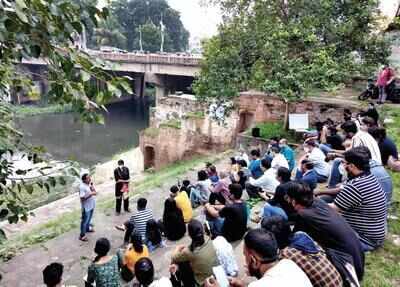- News
- City News
- vadodara News
- Young bridge Vishwamitri with people

The group has started nature walks and talk series to raise awareness
Vadodara: Vadodara Municipal Corporation’s attempt at ‘cleaning’ the Vishwamitri river had sparked a furore among the environmentalists and activists, yet the civic body went ahead with its drive. The work has stopped now after the civic body received a rap from the National Green Tribunal.
Now, the young generation of the Banyan City has come forward to raise awareness among Barodians about the river, its ecology and to reconnect them with it.
The group under the banner of ‘Voices of Vishwamitri’ has started nature walks and talk series to make people understand that the river is not just flowing water that they see and pass by daily, but a living water body that also consists of a thriving population of crocodiles, insects, birds, vegetation and several other living beings.
“Several initiatives are being run to save the Vishwamitri but none of them had participation of the younger generation. Also, the youth of the city do not know much about the river. So, we started this initiative where we call experts for talks in an attempt to pass on the knowledge to the young generation so that they can connect with the river,” said Rutvik Tank, an urban planner.
“Earlier people used to go to the river to fetch water for their daily purposes, but as every house now has taps, people have forgotten the importance of the river and have been disconnected from it,” he added.
Apart from nature walks along the river, the group has so far organized two talk sessions — one on hydro-geological features of Vishwamitri and other on its cultural history and historical structures located around the river.
“Once a person understands the importance of the river, they can then contribute by continuing to spread the awareness among more people. We are focusing on Vishwamitri but on a larger scale, this is applicable to all urban rivers,” said Zameen, another group member.
The group consisting of civil engineers, biologists, artists and architects are planning to organize more talks on pollution, wildlife, botany, water system, law, planning, mythology among other themes along with cultural and art sessions.
Tank told TOI that at every session, the number of participants has been swelling. “There is curiosity among people and they now feel that something should be done at a bigger policy level,” Tank said.
Now, the young generation of the Banyan City has come forward to raise awareness among Barodians about the river, its ecology and to reconnect them with it.
The group under the banner of ‘Voices of Vishwamitri’ has started nature walks and talk series to make people understand that the river is not just flowing water that they see and pass by daily, but a living water body that also consists of a thriving population of crocodiles, insects, birds, vegetation and several other living beings.
“Several initiatives are being run to save the Vishwamitri but none of them had participation of the younger generation. Also, the youth of the city do not know much about the river. So, we started this initiative where we call experts for talks in an attempt to pass on the knowledge to the young generation so that they can connect with the river,” said Rutvik Tank, an urban planner.
“Earlier people used to go to the river to fetch water for their daily purposes, but as every house now has taps, people have forgotten the importance of the river and have been disconnected from it,” he added.
Apart from nature walks along the river, the group has so far organized two talk sessions — one on hydro-geological features of Vishwamitri and other on its cultural history and historical structures located around the river.
“Once a person understands the importance of the river, they can then contribute by continuing to spread the awareness among more people. We are focusing on Vishwamitri but on a larger scale, this is applicable to all urban rivers,” said Zameen, another group member.
The group consisting of civil engineers, biologists, artists and architects are planning to organize more talks on pollution, wildlife, botany, water system, law, planning, mythology among other themes along with cultural and art sessions.
Tank told TOI that at every session, the number of participants has been swelling. “There is curiosity among people and they now feel that something should be done at a bigger policy level,” Tank said.
FacebookTwitterLinkedinEMail
Start a Conversation
end of article
Quick Links
Delhi Air PollutionDelhi TemperatureChennai WeatherBangalore TemperatureCovid vaccination centres in DelhiCoronavirus in DelhiRTPCR test in GurgaonHyderabad RainPollution level in BangaloreDelhi SmogDelhi TemperatureNoida AQIGurgaon AQI todayFire in MumbaiMumbai RainsCovid 19 RT PCR Test in NoidaDelhi AQI todaySrinagar encounter

